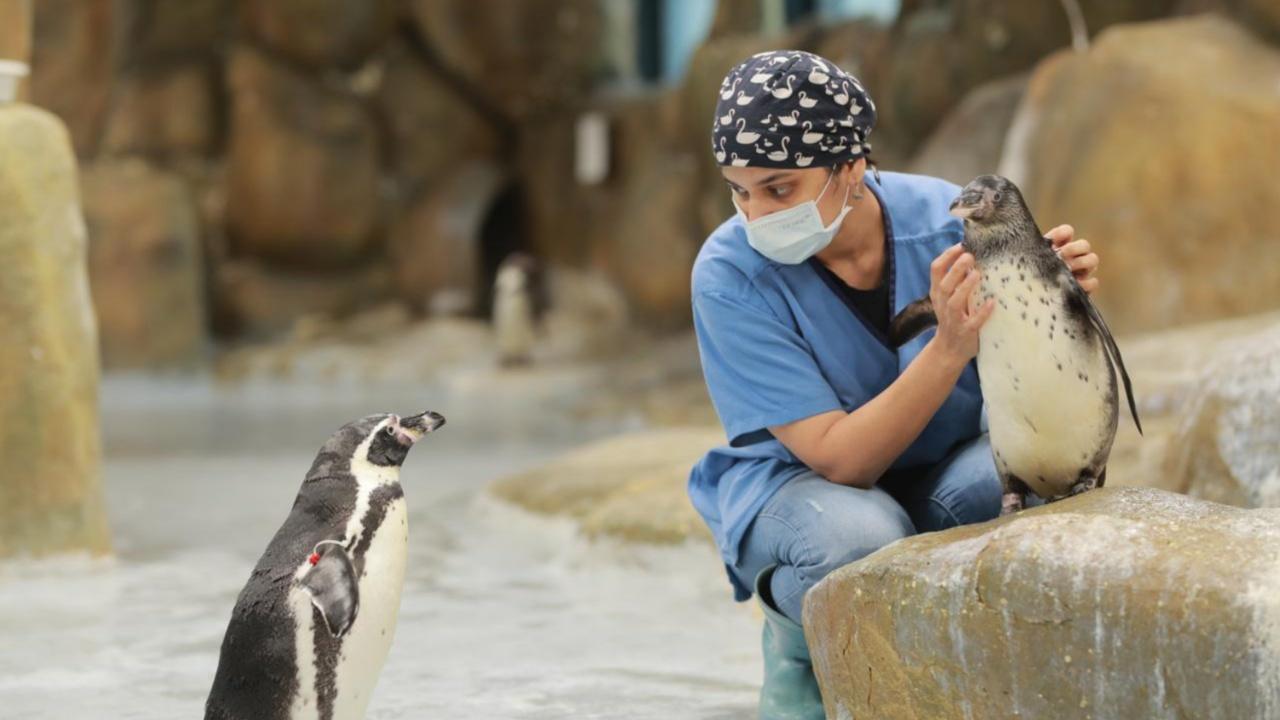Humboldt Penguins at the Byculla Zoo are expected to be joined by more happy feet this year. In 2016, three male and four female penguins were brought from Seoul, South Korea, and inducted into the Mumbai Zoo. Their population might rise via monitored breeding at the artificial facility

A curious penguin peeps at veterinary Dr. Madhumita Kale, in the special enclosure at Mumbai's Byculla Zoo. Photo Courtesy: Madhumita Kale
With a total of 12 Humboldt penguins inhabiting the Veermata Jijabai Bhosale Udyan And Zoo in Mumbai, the veterinary doctor Madhumita Kale hints at a rise in the population of Penguins. In 2016, three male and four female penguins were brought from Seoul, South Korea, and inducted into the Mumbai Zoo, also known as the Byculla Zoo. Under constant care and monitored breeding by Dr Kale's team, the Penguin population has been rising significantly.
ADVERTISEMENT
Dr Kale has been serving as the Humboldt penguins’ vet since 2016, the same year when the happy feet first arrived in Mumbai. She currently heads a team of eight, including doctors and zookeepers who look after Penguins round the clock, in three shifts of eight hours each. A day in the life of Dr Kale’s team watching over the flightless birds is nothing less than an adventure.
She arrives at the zoo facility by 8 am to find the glass, the exhibit, and the pool spick and span. Before her arrival, the zookeepers have been at work to ensure a clean facility for people to patronise the Penguins, who enjoy celebrity-like popularity at the zoo. The swimming pool is vacuumed and their nests have been sanitised to ensure hygiene. A medicinal dose has already been administered by the night doctor and the eggs/chicks have also been fed before her arrival.
“Once I come, the keepers prepare the fish for feeding the Penguins. By 9-9:30 am, we provide the first feeding of the day”, shared Dr Kale. Penguins at the Mumbai Zoo are being fed a diet of Bombay duck, mackerel, eel, and ladyfish. They are fed twice a day, once in the morning and the next in the evening. Every penguin eats around 700-800 gm of fish which is stored at –20°C and brought to room temperature at the time of feeding. “We take utmost care when it comes to their food as the fish they eat is cleaned thoroughly. In two weeks or a month, we send the fish used for feeding for testing at the Bombay Veterinary College."
When asked about the raging heatwave and its impact on Penguins, Kale shared that the temperature-controlled exhibit serves as a shield against any weather turmoil. Ever since the penguins arrived at the Byculla Zoo facility, they have been kept in a quarantine environment with temperatures regulated between 16-18 degrees Celsius. “We maintain a constant temperature and humidity at the zoo facility. Whether it is heatwave, summer, winter, or monsoon, Penguins don’t undergo any weather changes at the facility.”
IN PHOTOS: Visit Byculla Zoo this World Penguin Day
Going by the names of Oreo, Oscar, Donald, Daisy, and more, Dr Kale can identify them just by seeing them. For visitors and new team members, the flippers of Penguins are tagged with different colour codes for better identification. When asked about new additions to the family, Dr Kale shares that five new Penguins have taken birth at the facility raising the numbers to 12 from 7 since 2016. “Officially, we will share the rise in numbers once the Zoo announces."
Also Read: Female butterflies mate 1.5 times on average, despite male shortage
 Subscribe today by clicking the link and stay updated with the latest news!" Click here!
Subscribe today by clicking the link and stay updated with the latest news!" Click here!







